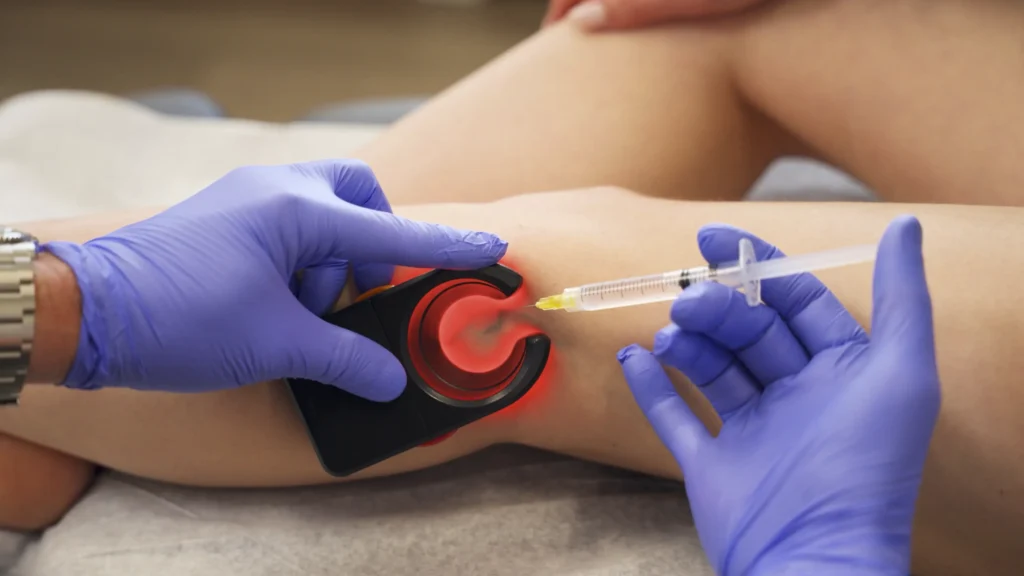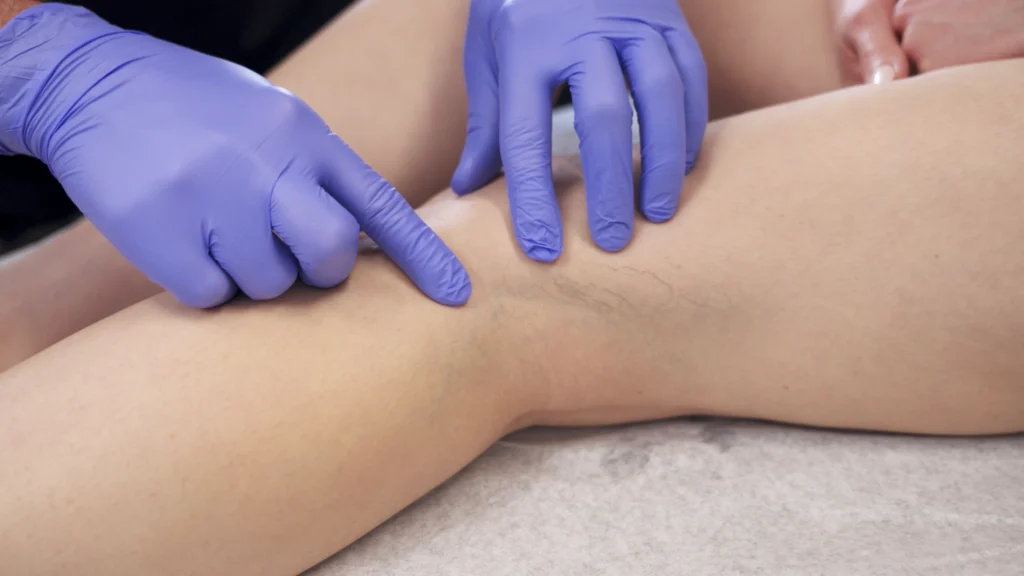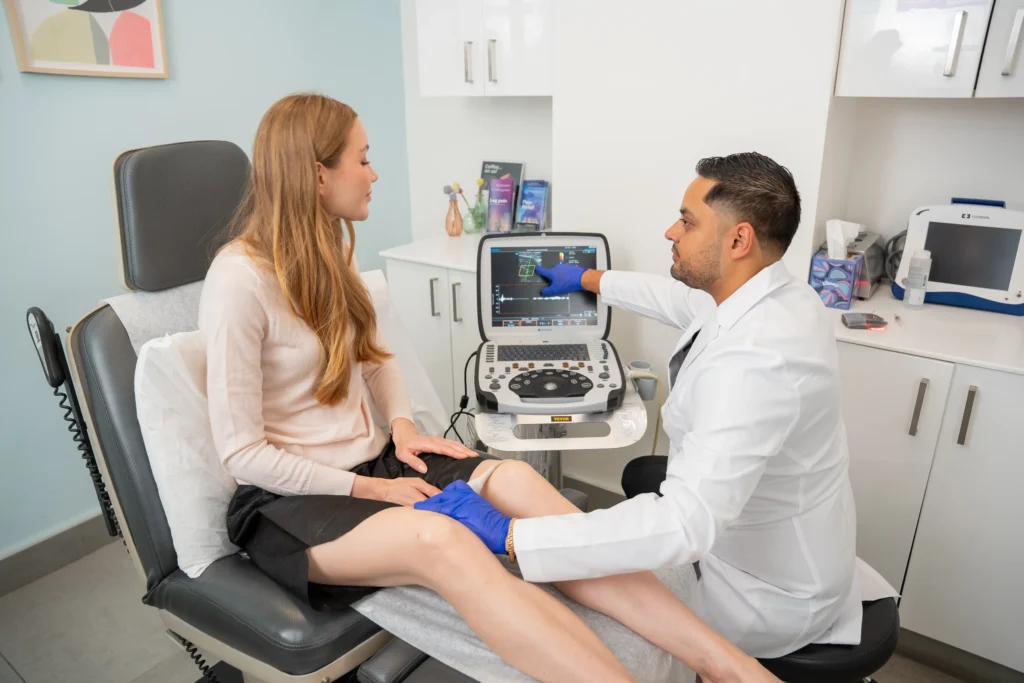These Are the Best 5 Treatments for Varicose Veins!
Do your legs often feel heavy, achy, or swollen after a long day of standing or sitting? If you’ve noticed bulging, twisted veins running down your legs, you might be dealing with varicose veins. This common condition can cause discomfort, fatigue, and even embarrassment due to its appearance. Varicose veins aren’t just a cosmetic issue—they can indicate a deeper problem known as venous insufficiency, which requires medical attention to prevent complications.
At Vein Treatment, we specialize in minimally invasive treatments to help you get rid of varicose veins while addressing the root cause of the problem. Our board-certified vein doctors use state-of-the-art techniques to ensure you receive the best care. Read on to learn about the best treatment for varicose veins and which one might be right for you.
Endovenous Laser Ablation (EVLA)
Endovenous laser ablation, or EVLA, is widely considered one of the best treatments for varicose veins. This treatment uses laser energy to seal off problematic veins, rerouting blood flow through healthier veins. It’s a quick, effective, and minimally invasive treatment option with little to no downtime.
Here’s how it works: your vein doctor uses ultrasound guidance to insert a small catheter into the affected vein. Once inside, the laser fiber delivers heat energy that damages the vein wall, causing it to collapse and close off. Over time, the body naturally absorbs the closed vein, and blood flow improves. The treatment is usually performed under local anesthesia and takes less than an hour.
EVLA is a highly effective method for treating varicose veins, with success rates exceeding 95%. You’ll likely experience relief from symptoms like leg pain, heaviness, and swelling within a few days. Plus, the treatment is covered by most insurance plans if the varicose veins are causing medical issues.
Radiofrequency Ablation (RFA)
Radiofrequency ablation (RFA) is another top-tier treatment for varicose veins. Like EVLA, it’s minimally invasive and works by closing off malfunctioning veins, but instead of using laser energy, RFA utilizes radiofrequency waves to generate heat.
Your vein specialist will insert a catheter into the damaged vein under ultrasound guidance. The radiofrequency energy heats the vein walls, causing them to collapse and seal shut. The closed vein is gradually absorbed by the body, and blood flow is redirected to healthier veins.
RFA is an excellent choice for those seeking treatment with minimal discomfort and quick recovery times. Most patients return to their normal activities within a day or two, and the results are long-lasting. Just like EVLA, RFA is typically covered by medical insurance when treating varicose veins due to underlying venous insufficiency.
VenaSeal
If you’re looking for an even less invasive option, VenaSeal might be the best treatment for varicose veins in your case. VenaSeal uses a special medical adhesive to close off varicose veins. The adhesive is delivered via a catheter, and once the affected vein is sealed, blood is rerouted to healthier veins.
VenaSeal doesn’t require tumescent anesthesia (a numbing solution injected around the vein), which means less discomfort during and after the treatment. Additionally, VenaSeal doesn’t use heat to close the vein, which reduces the risk of nerve injury and other complications.
VenaSeal is highly effective, with clinical studies showing success rates of over 94%. The treatment is quick, usually taking less than 30 minutes, and patients can walk out of the clinic immediately after. However, while VenaSeal is a medically necessary treatment, it’s not yet covered by all insurance plans because it’s a relatively new treatment.
ClariVein
ClariVein is a newer, advanced option for treating varicose veins that combines two technologies: mechanical rotation and chemical sclerosant. This treatment is highly effective for larger veins and patients who want a minimally invasive treatment with no heat or anesthesia.
Here’s how ClariVein works: your vein doctor inserts a rotating catheter into the affected vein, which agitates the vein wall, allowing the sclerosant (a chemical solution) to penetrate and seal the vein. Because ClariVein doesn’t involve heat or anesthesia, it results in less discomfort and a quicker recovery compared to other treatments like EVLA and RFA. ClariVein is particularly appealing for individuals looking for a quick, painless treatment with excellent results.
Ambulatory Phlebectomy
Ambulatory phlebectomy is a specialized treatment for removing large varicose veins that are close to the surface of the skin. While other treatments close off the problematic vein, ambulatory phlebectomy physically removes the vein through tiny incisions in the skin.
During this treatment, your vein specialist makes small punctures along the vein and gently removes it using specialized hooks. Since the incisions are so small, stitches aren’t necessary, and the scars are almost invisible once healed.
Ambulatory phlebectomy is often combined with other treatments like EVLA or RFA to ensure the best possible results. It’s especially effective for veins that are too large for sclerotherapy or too twisted to be treated with laser or radiofrequency energy. The treatment is performed under local anesthesia, and most patients can return to normal activities within a day.
FAQs
What is the best treatment for varicose veins?
The best treatment for varicose veins depends on your specific condition. Endovenous laser ablation (EVLA), radiofrequency ablation (RFA), and VenaSeal are among the most effective options. A vein specialist can diagnose the severity of your varicose veins and recommend the most suitable treatment plan.
Is varicose veins surgery painful?
Varicose veins surgery is considered an outdated treatment that involves hospitalization, general anesthesia, and considerable downtime. And yes, recovery from surgery can be painful. However, most minimally invasive varicose veins treatments, like EVLA and RFA, are performed under local anesthesia and result in minimal discomfort. You may feel slight pressure or a warm sensation during the treatment, but severe pain is rare.
How do I prevent varicose veins from coming back?
While treatments like EVLA and VenaSeal can effectively eliminate varicose veins, practicing good habits can help prevent new ones from forming. Regular exercise, maintaining a healthy weight, elevating your legs, and avoiding long periods of standing or sitting can help reduce the risk of recurrence. Contact us to learn how to prevent varicose veins.
Does insurance cover vein treatments?
Most vein treatments are covered by medical insurance if they are deemed medically necessary, such as when varicose veins cause pain or swelling. At Vein Treatment, we provide insurance verification so you know what’s covered before your first visit.
Find the Best Treatments for Varicose Veins
Whether you’re experiencing discomfort from varicose veins or are concerned about their appearance, it’s essential to seek professional care. At Vein Treatment, we offer the best treatments for varicose veins, including EVLA, RFA, VenaSeal, ClariVein, and ambulatory phlebectomy. With state-of-the-art locations in New York, Long Island, California, Maryland, and New Jersey, we provide personalized care and help you find relief. Visit your nearest vein clinics or contact us to schedule a consultation and start your journey to healthier legs!







